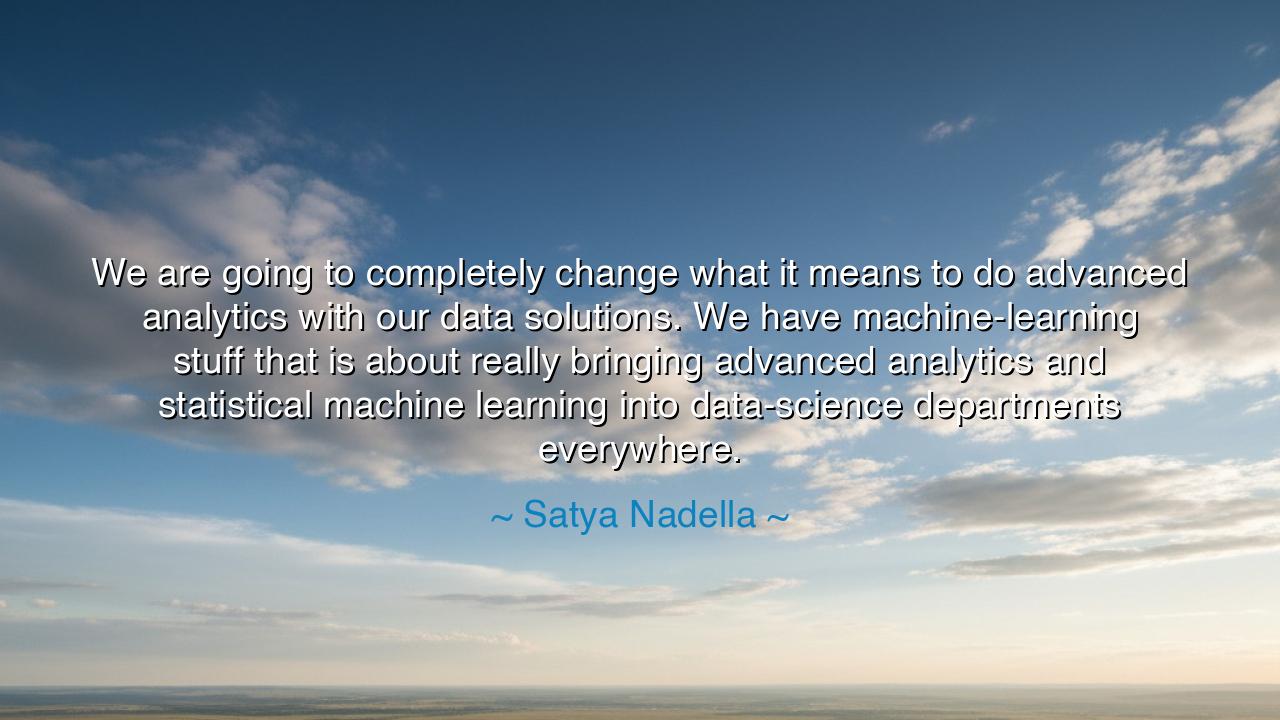
We are going to completely change what it means to do advanced
We are going to completely change what it means to do advanced analytics with our data solutions. We have machine-learning stuff that is about really bringing advanced analytics and statistical machine learning into data-science departments everywhere.






When Satya Nadella proclaimed, “We are going to completely change what it means to do advanced analytics with our data solutions. We have machine-learning stuff that is about really bringing advanced analytics and statistical machine learning into >machine learning and advanced analytics will serve as the modern tools of discovery, as revolutionary as the telescope was to Galileo or the compass to the first explorers.
The origin of this statement comes from Nadella’s role as the leader of Microsoft, a company that has long stood at the crossroads of technology and human progress. Under his leadership, the company shifted from building mere software to crafting ecosystems of intelligence — systems where data becomes not just information, but understanding. Nadella’s vision was to democratize these powers: to bring the ability to see patterns, predict outcomes, and solve problems to every corner of industry and science. In doing so, he sought to remove the veil that had long hidden the deeper rhythms of reality — the mathematical music that underlies all things.
In this declaration, Nadella touches on a truth as old as civilization itself: that knowledge evolves not only through intellect but through the tools that expand it. The abacus gave rise to trade. The printing press gave rise to enlightenment. Now, artificial intelligence gives rise to a new kind of cognition — one that merges human intuition with the precision of the machine. To “change what it means to do advanced analytics” is to redefine the very act of thinking, for when machines begin to perceive patterns faster and deeper than the human mind, humanity must learn to ask better, bolder, more meaningful questions.
Throughout history, those who embraced the instruments of their age reshaped the destiny of nations. When Isaac Newton discovered the laws of motion, he did so not with divine revelation, but with tools of measurement and observation refined by his time. His genius was not separate from his instruments; it was amplified by them. So too in this age: the data-science departments Nadella speaks of are the new observatories, where analysts peer not into the heavens but into the vast cosmos of digital knowledge — finding order in chaos, truth in torrents of numbers. The tools may differ, but the spirit remains eternal: the drive to understand creation itself.
Yet, Nadella’s vision carries a moral undercurrent, as all wisdom must. For while machine learning offers immense power, it also bears immense responsibility. A sword forged without guidance cuts the wielder as easily as the foe. Data without ethics becomes tyranny; automation without empathy becomes oppression. Thus, the task is not only to expand what analytics can do, but to refine how and why it is done. The ancients spoke of tempering iron with fire and discipline — so too must modern humanity temper technology with virtue, ensuring that the intelligence we create serves the flourishing of all, not the few.
The lesson in Nadella’s words is both practical and philosophical: embrace innovation, but do so with intention. Let the mind learn alongside the machine, not beneath it. In every field — medicine, education, art, or governance — the thoughtful application of data can illuminate paths once unseen. But it must always serve the human spirit, never replace it. The purpose of progress is not to make humans obsolete, but to make them more capable, more creative, and more compassionate through the power of insight.
So let Nadella’s vision stand as a call to action for the generations of thinkers and builders who follow. Learn the language of machines, but never forget the poetry of humanity. Seek advanced analytics, but let wisdom guide your use of it. For in this new age of data and intelligence, the greatest minds will not be those who command the most powerful algorithms, but those who use them to illuminate truth, nurture understanding, and serve the good of the world. As the ancients once looked to the stars to chart their destiny, so now must we look into the vast constellations of data — not to worship the machine, but to rediscover ourselves.






AAdministratorAdministrator
Welcome, honored guests. Please leave a comment, we will respond soon